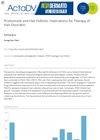88 citations,
August 2019 in “Frontiers in immunology” Tyrosine kinases are important in skin autoimmune diseases and could be targets for new treatments.
56 citations,
November 2007 in “Molecular and cellular endocrinology” Two enzymes regulate androgen receptor activity, affecting treatments for androgen insufficiency and benign prostatic hyperplasia.
44 citations,
February 2023 in “Cell” Fingerprints form uniquely before birth due to specific genetic pathways and local signals.
39 citations,
September 2007 in “BMC developmental biology” Neuregulin3 affects cell development in the skin and mammary glands.
36 citations,
October 2009 in “Journal of biological chemistry/The Journal of biological chemistry” Two new compounds were found to build bone and muscle without affecting reproductive organs and skin oil glands.
27 citations,
March 2008 in “Cell stress & chaperones” Localized heat or specific injections can prevent chemotherapy-induced hair loss without affecting cancer treatment.
24 citations,
June 2013 in “Journal of neuroendocrinology” Neuroactive steroids and the enzyme 5α-reductase might be involved in the development of Tourette's syndrome.
22 citations,
January 2009 in “Advances in experimental medicine and biology” FOXN1 mutations cause severe immunodeficiency, hair loss, nail issues, and thymus defects.
18 citations,
November 2012 in “Current opinion in urology” Finasteride and dutasteride are equally effective and safe for treating benign prostatic hyperplasia.
 16 citations,
November 2017 in “Acta dermato-venereologica”
16 citations,
November 2017 in “Acta dermato-venereologica” Prostanoids, like prostaglandins and thromboxane A2, can both enhance and inhibit hair growth, and understanding their effects could help treat hair disorders.
 15 citations,
July 2021 in “Bosnian Journal of Basic Medical Sciences”
15 citations,
July 2021 in “Bosnian Journal of Basic Medical Sciences” Stem cell therapy is promising for treating various health conditions, but more research is needed to understand its full potential and address challenges.
14 citations,
May 2016 in “Therapeutic advances in urology” Taking tadalafil and finasteride together is safe and effective for treating urinary symptoms and erectile dysfunction in men with enlarged prostates.
13 citations,
May 2021 in “FASEB bioAdvances” Plant-based products can improve hair and skin health without harmful side effects.
10 citations,
July 2015 in “International Journal of Trichology”  9 citations,
December 2022 in “Phytomedicine”
9 citations,
December 2022 in “Phytomedicine” More high-quality research is needed to recommend flavonoids and saponins for clinical use.
 8 citations,
August 2021 in “Fertility and Sterility”
8 citations,
August 2021 in “Fertility and Sterility” Treatments for enlarged prostate can cause problems with ejaculation, and less invasive options might preserve sexual function better.
7 citations,
August 2020 in “Current topics in medicinal chemistry” New cancer treatments aim to reduce side effects and improve effectiveness.
 7 citations,
March 2019 in “Cancer Epidemiology, Biomarkers & Prevention”
7 citations,
March 2019 in “Cancer Epidemiology, Biomarkers & Prevention” Finasteride use is not clearly linked to an increased risk of male breast cancer.
6 citations,
March 2022 in “International journal of molecular sciences” Natural skincare products may help reduce sun damage and support the skin's daily cycle.
5 citations,
December 2018 in “The Journal of clinical psychiatry/The journal of clinical psychiatry” Tamsulosin may slightly increase dementia risk compared to other treatments for enlarged prostate.
 5 citations,
February 2017 in “Biomolecules & Therapeutics”
5 citations,
February 2017 in “Biomolecules & Therapeutics” 4-O-Methylhonokiol helps protect skin cells from growth-stopping effects of a protein by regulating growth-related pathways.
 4 citations,
May 2024 in “The Lancet”
4 citations,
May 2024 in “The Lancet” Bariatric surgery improves ovulation rates in women with PCOS and obesity better than medical therapy.
 4 citations,
January 2023 in “Journal of Human Hypertension”
4 citations,
January 2023 in “Journal of Human Hypertension” Women experience more side effects and have worse blood pressure control from hypertension treatments than men, despite using different medications.
 2 citations,
August 2022 in “Reproductive Biology and Endocrinology”
2 citations,
August 2022 in “Reproductive Biology and Endocrinology” Magnesium supplements improved quality of life for women with polycystic ovary syndrome, but didn't help with acne, hair loss, or abnormal bleeding.
 1 citations,
January 2023 in “Metabolites”
1 citations,
January 2023 in “Metabolites” Changes in gut bacteria can contribute to the development of Polycystic Ovary Syndrome (PCOS), affecting metabolism, immunity, and causing inflammation. Treatments may involve adjusting these factors.
 1 citations,
December 2022 in “BMC Public Health”
1 citations,
December 2022 in “BMC Public Health” Long-term effects of COVID-19 can vary over time and are more likely in certain age and gender groups, while race, income, and education levels have little to no impact. Ongoing medical care is needed due to potential complications.
 1 citations,
September 2021 in “Skin appendage disorders”
1 citations,
September 2021 in “Skin appendage disorders” Botulinum toxin injections can help treat common hair loss in men, but more research is needed to confirm this and understand how it works.
 December 2024 in “Cell Communication and Signaling”
December 2024 in “Cell Communication and Signaling” Fat tissue vesicles protect skin from UV damage better than stem cell vesicles.
August 2024 in “Cosmetics” Personalized treatments for hair loss are becoming more effective by using genetic information.
March 2024 in “Antioxidants” Excessive blue light harms eye cells and disrupts sleep patterns.












